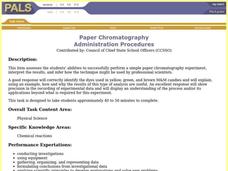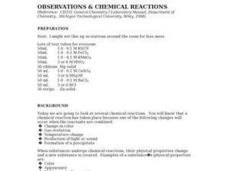Curated OER
Water and Ice
Young scholars explore the states of matter. In this physical science lesson, students observe what happens to water when it freezes and record observations. Young scholars then observe ice when it melts and record observations.
Curated OER
Introduction to AP Chemistry
Learners are introduced to concepts in an AP Chemistry class. They work together to complete experiments on different materials. They discuss the results of the experiments.
Curated OER
Paper Chromatography
Young scholars use this design the illustrate how ink can be separated into its component chemicals using paper chromatography. They use five unknown samples of ink on pre-labeled chromatography strips are provided to students. Young...
Curated OER
Identifying Elements
Young scholars use diffraction glasses to find similarities and differences between observed spectrum of fluorescent light and an incandescent light They work in groups of 4-6 for the experiment/activity part of this exercise.
Curated OER
Paper Chromatography
Small groups of students perform paper chromatography to separate food dyes into their component colors. Students perform the experiment and collect, organize, and represent their data to form an explanation of their outcomes. Students...
Curated OER
HOW FAST DO SEDIMENT GRAINS OF DIFFERENT SIZES SETTLE?
Students conduct an experiment using sand, a jar, and a paper clip to analyze the effects of different kinds of sand vis a vis its sediment. They graph their findings and analyze for factors of size, shape, and density.
Curated OER
Effects of the Southern Pacific Railroad Causeway
Fifth graders describe the appearance of a substance before and after a physical change. They re-create the Southern Pacific Railroad Causeway across the Great Salt Lake. They determine for themselves how the water is exchanged...
Curated OER
Great Blobs of Jelly!
Students explain how zoo-plankton have an impact on the global process. In this ocean zoo-plankton lesson students calculate carbon flux and plankton densities.
Curated OER
Investigating Convection Currents
Students examine how differences in the temperature and salinity of the water help create ocean currents. They perform an experiment which shows how temperature affects the circulation of ocean water.
Curated OER
Sea Floor Spreading I
Students use Excel to explore the geodynamics Model equation for ocean depth around a sea-floor spreading center. They complete an introductory tutorial on Excel for students with no prior Excel experience.
Curated OER
Shake, Rattle and Roll
Students compare the weathering of materials. in this weathering lesson, students experiment with the chemical and physical weathering of different materials. Students use salt and water as an example of how weathering occurs.
Curated OER
Floating Soap
Young scholars explore the density of soap. In this science lesson, students conduct an experiment to find which types of soap will float. Young scholars make a hypothesis and record their observations.
Curated OER
Exploring the Interstellar Medium
Students investigate the Interstellar Medium and the Local Bubble that the Sun is inside. They read and discuss a handout, answer discussion questions, observe a demonstration of light scattering, and conduct an experiment on the...
Curated OER
The Drag of Drag
Students are told that any object moving through a fluid (air, water, molasses, etc) experience a drag force which oppose the motion. They are given the summarized version of drag which is proportional to the square of the velocity....
Curated OER
Physical/Chemical Properties of a Burning Candle
Learners investigate the physical and chemical properties of a candle before and after it is lit. They conduct a burning candle experiment, and complete a KWL chart and worksheet, recording the results of the investigation.
Curated OER
Observations & Chemical Reactions
Students conduct a series of experiments in which they explore chemical reactions. They detect chemical changes by observing how physical properties change when two different chemicals are combined. They list and describe the reactants...
Curated OER
Hot Gas Or Cold Gas Lab
Students engage in a lab project to study chemical reactions. They use guided questions to help facilitate the lab experience and come to the correct outcomes. The lesson does not contain a true understandable objective. The lesson could...
Curated OER
Volumw Measurement, English System
Eighth graders biew each volume container and discuss where they have seen them in their home, and how they have seen them used. They explore the different names of volume sizes and their equivalents towards one another. Students...
Curated OER
The Buoyancy Factor
Students examine why some objects float in water while others sink and the ability of something to float does not depend entirely on its weight. Archimedes' principle is introduced and buoyant force is discussed. Practice calculations...
Curated OER
Clay Boats
Seventh graders are given the opportunity to use model-building as a way to help comprehend the forces and phenomena at work in the world around them. They use both successful and unsuccessful models to make inferences, refine...
Curated OER
Observing and Classifying Rocks
Fourth graders examine various types of rocks and record their properties. They collect rocks at home and bring them to school where they are mixed and distributed to groups of students. After writing their observations on...
Curated OER
Can We Measure the Impossible?
In this measurement worksheet, students explore methods to measure the thickness of foil. They write an essay on how they calculated the thickness of the foil, and the number of atoms thick it is. Students create labeled sketches to...
Curated OER
Sunlight and Warm Air
Students discuss radiant energy from the sun, performing a simple experiment with sun glasses and bright light to demonstrate the concept. Students further participate in simple in-class experiments to demonstrate: air density as it...
Curated OER
Marine Debris on the Chesapeake Bay
Students examine problem of litter and marine debris on the Chesapeake Bay, and experiment with density of marine debris.























